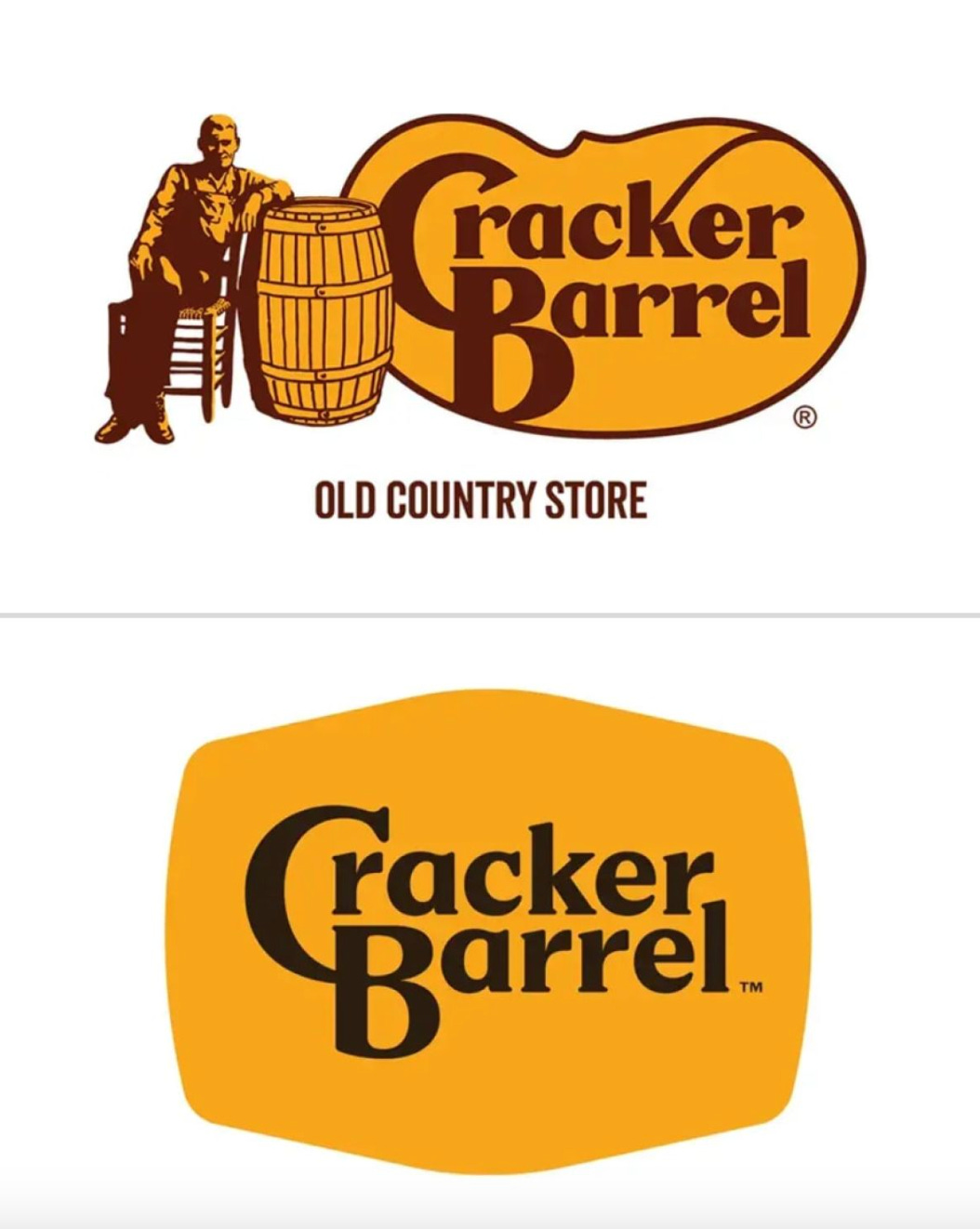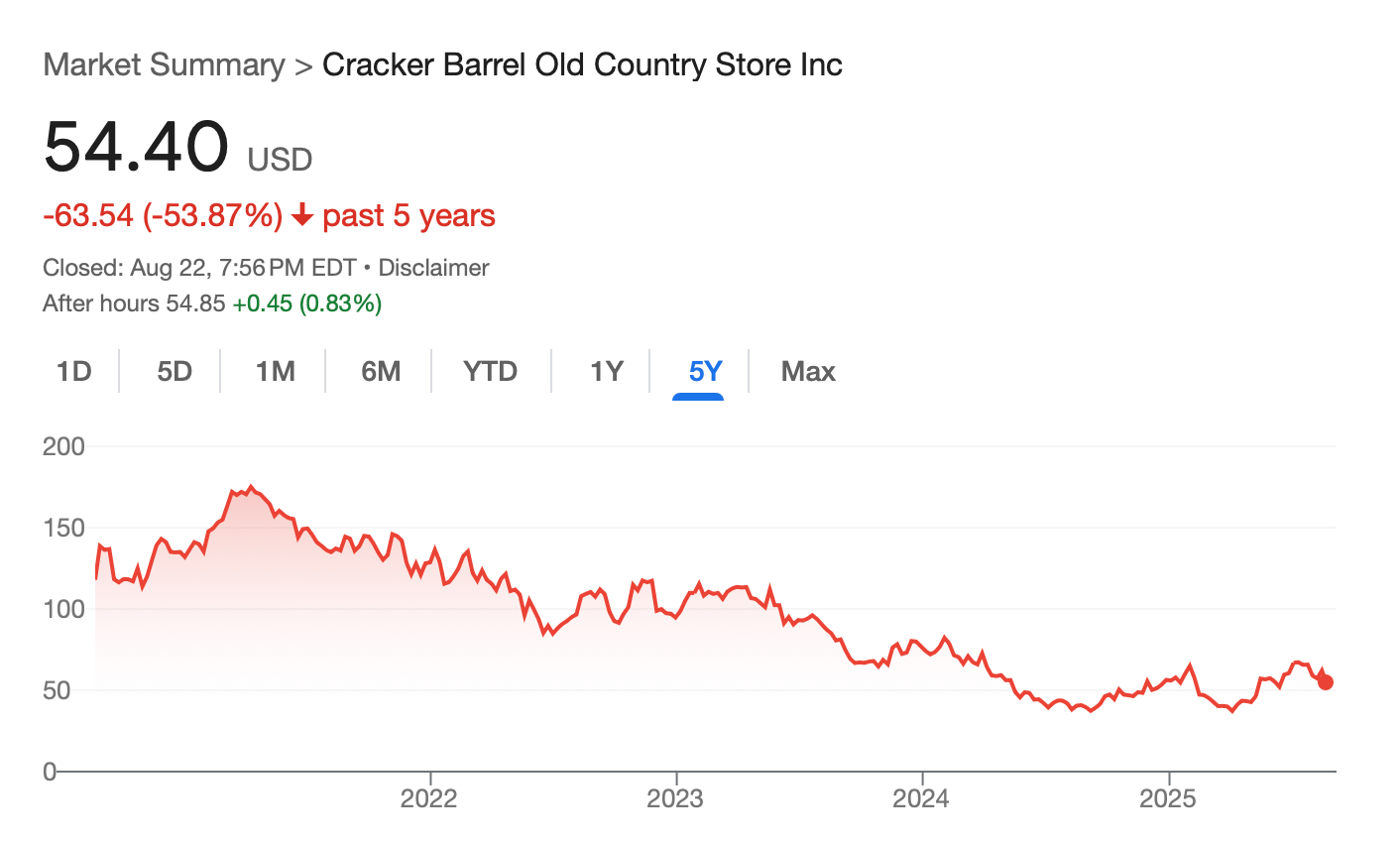The Big Lie About The Cracker Barrel Logo Change
My day job is dealing with big companies gone political. Here's the truth about Cracker Barrel.
So if you’ve been under a rock, you may have missed the most rage-generating story of the week: Cracker Barrel falling victim to Minimalism, the Branding Disease. In a widely covered move, the restaurant chain ditched its historic logo, featuring a man and a barrel, for something a bit more… simple.
You would have thought the Internet blew up, with stories like “Cracker Barrel Is Dead, And Its Stupid Woke CEO Killed It With Gay Nonsense” making waves across the Internet. Gotta admire the prose. But… what actually happened? Did Cracker Barrel scratching the Minimalism Itch actually kill the brand? Or was it just the latest event in a chain?
As you can probably guess, the answer is the latter, for reasons including, well, minimalizing your logo and modernizing your interior decor aren’t particularly “woke” things in and of themselves. So, let me put on my corporate engagement professional hat and say a few words about how brands actually become politicized and damaged.
How - and Which - Businesses Go Political
If you want to understand which companies get in hot water for ‘going woke,’ you have to understand which companies actually have to care the most about their perception. The reality is, not all brands are equal on this front. Buckle up, this is a bit complicated. There are two numbers to think about here: (1) brand value and (2) market value. The brand value, in short, is approximately how much the company brand name is worth (how much is it worth to be able to put the Apple logo or the Nike swoosh on a product). The market value is how much the company’s actually worth. So, companies where the brand value is a relatively low proportion of the market value (think oil companies, B2Bs, banks, etc) don’t have nearly as much to lose on negative brand perception. But companies whose brand value is a relatively high proportion of market value (think tech, consumer-facing, or luxury products) have a great deal to lose.
Based on that metric, which one is Cracker Barrel? Consumer-facing. Brand-heavy. Americana brand. It’s a pretty high-risk brand on that front, and here’s why: the rebrand blowback resulted in almost $100M of damage to brand value, a significant amount compared to its $1.2B market value. But wait… is that an example of go woke, go broke? Let’s put it this way: it is another example of a classic, Americana brand slowly drifting away from its customer base. The graph that probably explains this best isn’t the 5-day view of Cracker Barrel stock that many are pointing to. It’s the 5-year view. Check it out:
Not exactly a stunning performance, followed by a fall. This was a slow roll down.
Pleasing Which People?
We can argue about why that happened (and I’d argue that the company choosing to use its brand to sponsor divisive social events and its governance policies to validate racial and gendered categories certainly didn’t build brand value). But it’s simply a lie to pretend like Cracker Barrel’s woes surfaced overnight, or that a dalliance with minimalism tanked a dominant brand. Its problems have been many years in the making.
An example: several years ago, I wrote on this Substack about Pennsylvania Senator John Fetterman’s affinity for hoodies. At the time, I didn’t think anyone really cared about him wearing hoodies as much as they cared about him not being a confidence-inspiring lawmaker. (“We don’t care that politicians wear hoodies. We care when politicians bring hoodie-level work to a job with suit-level expectations.”)
In the same way, the slow decline in Cracker Barrel’s Americana charm isn’t just because of a logo change or ditching modern benches. It’s because, for years, the company’s been drifting away from what made it seem special, and the core tenets of its brand that made it competitive in the restaurant industry.
What I’ll leave you with is something that not enough people in Anti-Wokeness World are saying: we shouldn’t be happy about that. At the end of the day, we want brands like Cracker Barrel to perform, and overperform, for the benefit of the people who depend on that performance for their wages and financial futures. It’s not a game. It’s an exercise in long-overdue brand confidence resuscitation.
What I’m Reading
Jerry Bowyer on Trump & debanking (WORLD Magazine).
Bank of America did not change a thing until quite recently. In fact, as we were going to press with this piece, the company informed Charlie Gasparino of the New York Post that it had modified its policies to ensure no debanking over religious viewpoints. Previously they had debanked a missionary organization that serves Ugandan widows and orphans. Not great optics, Bank of America. Also, not great risk management: The Lord of Hosts sides with the widow and the orphan, and He’s bigger than Biden.
David Bahnsen on Doug Wilson, Russell Moore, & Christian nationalism (Bahnsen.com).
Believing in structural pluralism (as I do), even while rejecting ideological pluralism (as I do), is not inconsistent. And wanting all of Dearborn, Michigan to become converted (from the preaching of the gospel) is not authoritarian or statist or racist or any other silly accusation en vogue today … it is Christian! You know what is not Christian? Not wanting all of Dearborn, MI to become Christian. Now, if someone out there believes that we could see all of Dearborn, Michigan converted and it what would make no difference in their public or civic life, be my guest, but you believe something that is utterly fantastical.
Carl Trueman on dogma (First Things).
The faith is not an expression of the religious consciousness of the community. Still less is it a function of the political tastes of those trying to use the Christian community to gain earthly power. It is the dogmatic expression of supernatural truths about God and man as his creature. Newman declared in his Apologia Pro Vita Sua: “From the age of fifteen, dogma has been the fundamental principle of my religion: I know no other religion; I cannot enter into the idea of any other sort of religion; religion, as a mere sentiment, is to me a dream and a mockery.”
That’s all for this time. Hoping to have a post up in the middle of next week about a publishing milestone of mine (and hopefully some other thoughts if the Colorado mountain air doesn’t cook my Pennsylvanian lungs). -Isaac






